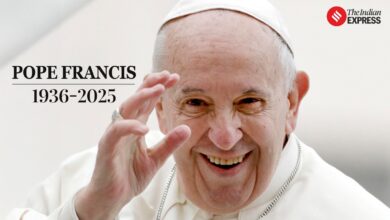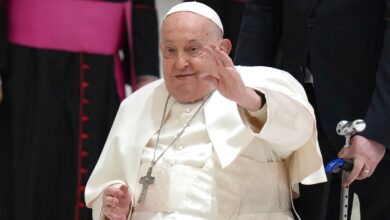In life, they showed Israel’s breadth. in death, they were victims.

At five minutes to eight on Tuesday evening, an Israeli teacher was on an evening stroll, pushing his ba son in a carriage. Up the street, a businessman was in his car, running a brief errand. Around the corner, two Ukrainian construction workers were chatting outside a popular convenience store. And a few blocks over, an Arab Israeli policeman was riding his motorcycle, keeping an eye out for trouble.
Minutes later, all five men were all dead — shot and killed a Palestinian gunman in the single deadliest terror attack in Israel in eight years. In life, their diverse backgrounds highlighted the breadth and complexity of Israeli society. In death, their shared fates stripped away that nuance, turning them all into victims of the same endless conflict.

Amir Khoury, the 32-year-old police sergeant, was an Arab Chrian who was about to buy a house with his Jewish fiancée.
“What a loss,” Ghazi Awwad, a lawyer who was close to Khoury in college, said Wednesday. “Not all Arabs are good, and not all Jews are good,” Awwad added. But “Amir was a bridge between Arabs and Jews.”
To many Israelis, the attack in Bnei Brak, a city in central Israel, heightened fears that the country was on the cusp of a wave of violence that could escalate further once the Muslim holy month of Ramadan, often a period of greater tension, starts at the end of this week.
It was the third deadly terror act in eight days — a rash of attacks that has left 11 people dead, and made March the deadliest month of militant violence, outside of a full-scale war, in several years.
The situation is not comparable to the second Palestinian uprising, or intifada, which left 1,000 Israelis and at least 3,000 Palestinians dead from 2000 to 2005, said Avi Dichter, a former director of the Israeli domestic intelligence agency, the Shin Bet.
Nevertheless, he said in a broadcast interview Wednesday, “we are in the midst of a very difficult wave of terror with different characterics than previous waves.” Previous terrorism campaigns often involved ill-planned stabbings and car-ramming younger men. “Here we see a wave of terror older people with automatic weapons,” he added.
The location of recent attacks has also taken Israelis surprise. One was in the southern city of Beersheba and another in the coastal city of Hadera — both rare targets for militants.
To the residents of Bnei Brak, the attack Tuesday also came as a shock. Bnei Brak has rarely been directly affected the Israeli-Palestinian conflict, and is better known as the home of highly religious Jews, or Haredim. The city was still grieving the death of a leading Jewish sage, Rabbi Chaim Kanievsky, whose funeral 10 days ago was one of the largest public gatherings in Israeli hory, drawing up to 750,000 mourners.
“Honestly, I never thought anything like this would happen here,” said Moshe Waldman, a 31-year-old accountant from Bnei Brak. “But then this happened right outside.”
Hearing gunshots on his streets Tuesday night, Waldman rushed to his window to see a Palestinian man outside carrying an assault rifle.
The man was Diaa Hamarsheh, a 27-year-old cellphone shop owner from the north of the occupied West Bank. The reasons Hamarsheh chose to attack Bnei Brak remained unclear; he left no note, and no militant group has claimed responsibility for his actions. Some residents of Bnei Brak said they recognized him, and thought he may have once lived illegally in the area while working in construction.
What is certain is that shortly before 8 p.m. Tuesday Hamarsheh walked north up Bialik Street, a quiet back road named after a prominent Zion poet, and stopped beside two foreigners chatting outside Idan’s Corner, a neighborhood convenience store.
They were Victor Sorokopot and Dimitri Mitrik, Ukrainians who moved to Israel several years ago, long before the Russian invasion of Ukraine in February, their neighbors and relatives said.
Hamarsheh stood behind them, raised his rifle, and shot them both dead.
Video showed him then firing at a near cycl, who escaped unharmed, before flagging down a passing car.
The car was driven Yaakov Shalom, 36, who had recently set up his own business, his family said. Shalom was off to buy supplies for the upcoming Passover festival when he turned south down Bialik Street and encountered Hamarsheh.
“Stop!” Hamarsheh shouted in Hebrew. Then he fired through a car window, hitting Shalom.
Shalom crashed his car, and slumped back in his seat — dead.
Hearing the gunshots, an emergency medic living across the street rushed outside to see if he could help.
Moments later, Menachem Englander, the medic, came face to face with Hamarsheh, surveillance video showed.
Hamarsheh raised his gun once again to kill Englander. But the gun jammed, allowing the medic to flee back inside, Englander said. “It all happened in one or two seconds,” he said.
Hamarsheh pressed on, heading west down Hashnayim Street, another quiet side road.
Soon he encountered Avishai Yechezkel, a 29-year-old teacher pushing his 1-year-old son, Ariel, in a carriage. Yechezkel shielded Ariel from the bullet, dying on top of the child, Yechezkel’s pregnant wife, Naama, said.
“This is the sort of man he was,” Naama Yechezkel said. “The last thing he did was to save his son.’’
Having killed his fourth victim, Hamarsheh headed toward a main road, in search of more targets.
Speeding down that road was Khoury, the Arab policeman from northern Israel. After the shooting was reported, Khoury had been sent to confront the attacker on his motorcycle. He rode with another police sergeant, who sat behind.
Reaching the scene, the second officer jumped from the motorcycle, exchanging fire with Hamarsheh.
Sixteen seconds later, the shooting stopped. It was two minutes past eight, according to video from the second officer’s body camera.
Hamarsheh lay slumped on the ground. But Khoury was also dying, shot Hamarsheh during the firefight.
“I told him to be careful,” Khoury’s fiancée, Shani Yashar, said Wednesday. “He said he would defend everyone, even if it cost him his life.”
Thirty miles away, in the West Bank, another family was also in a state of bewilderment — the Hamarshehs.
On Tuesday night, the family was at a hall in their hometown, Yabad, at a celebratory dinner for a family member who had won a recent election for a seat on the town council. It was there that they received news of the attack and their son’s involvement.
The celebration turned into stunned mourning, even as residents outside began to cheer what they considered a legitimate attack on an occupying power.
Hamarsheh owned a cellphone shop with his brother and had a side trade of selling cigarettes, which he brought in from Israel. That’s where he said he was going Tuesday afternoon after having lunch at his family’s home, his family said.
Hamarsheh was sentenced to 30 months in prison in 2013 for conspiracy to commit manslaughter and throwing objects at vehicles, according to Israeli military records. But his family always believed he was innocent.
“We still can’t understand that this happened,” his father, Ahmed Hamarsheh, said Wednesday of the attack in Bnei Brak. “How his life went in this direction, we don’t know.”
The consequences for Hamarsheh’s family had already begun.
Before dawn Wednesday, Israeli forces descended on Yabad, closing both entrances and surrounding the family’s neighborhood. They detained 22 residents, including Hamarsheh’s older brother, two cousins and an uncle, Yabad’s mayor, Saed Zaid al-Kilani, said.
Once the forces had finished searching the family home, an engineering unit took measurements of the apartment building, al-Kilani said. He said that, as per standard practice, he expected the Israeli army would soon destroy the home.
The Israeli army said any demolition would be subject to legal proceedings, in which the family has the right to appeal.






